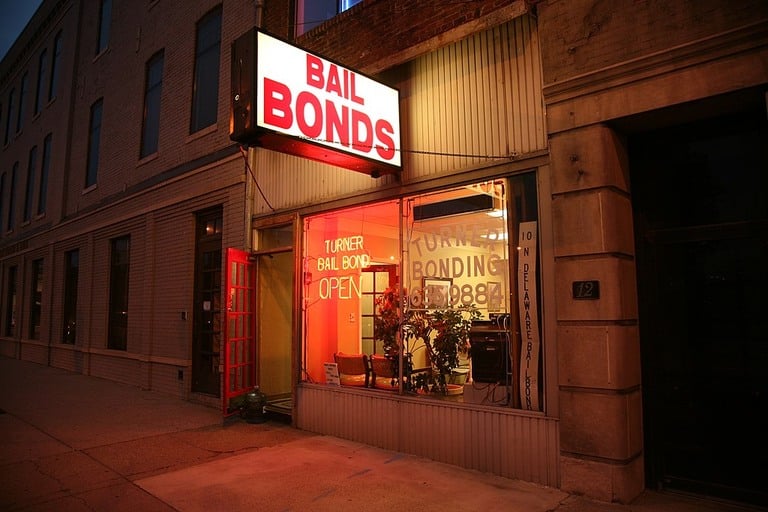Getting arrested in Florida gives anyone a good scare. Central to surviving this rough patch is **securing bail** fast. **Understand the bail bond process** with this guide; it could be a lifesaver when you’re in a bind.
Contents
Key Takeaways
The Basics of Bail Bonds in Florida
A bail bond acts as a surety, allowing arrested individuals to secure their release from jail until trial. When unable to pay the full bail amount set by the court, defendants may hire a bail bondsman, charging a non-refundable fee, often equating to 10% of the bond. This system has evolved significantly since its inception in the late 19th century, with national reforms addressing excessive bail issues.
Steps in Obtaining a Bail Bond in Florida
- Identify the location of the inmate
- Contact a bail bond agent like Bail Bonds Now for an access code
- Initiate the online bail bond application
- Pay the fee and secure a bond release
In Florida arrest cases involving DUI charges, the booking process must be completed before bond release, depending on dropping blood alcohol levels. Bail Bonds Now operates statewide, providing 24/7 services, allowing defendants or their representatives to apply and pay for bail bonds online without hassle.
Your Responsibilities When Signing a Bail Bond Agreement
Upon signing a bail bond agreement in Florida, a defendant becomes accountable to the bail bondsman until the conclusion of their court cases. Their defendant’s responsibilities include:
- Maintaining contact with the bail bondsman
- Adhering to bond conditions, such as staying within a specified area
- Attending all scheduled court appearances
Failure to appear in court may result in a bond forfeiture, making the bail bondsman liable for the full bail amount. This creates a strong motivation for bail bond agents to ensure defendants comply with court requirements and bond conditions.
Types of Bail Bonds in Florida
Cash Bail Bonds
Cash bail bonds are a common type of bail bond used in the Florida criminal justice system. Defendants who are unable to afford the full amount of their bail can turn to a bail bondsman for assistance. These bail bondsmen provide a 24-hour bail bond service to help defendants secure their release from jail. When a defendant chooses a cash bail bond, they are required to pay the full amount of their bail in cash. This ensures that they will appear in court for their scheduled hearings. If the defendant fails to appear, the bail bond is forfeited and a warrant is issued for their arrest. Cash bail bonds offer a way for defendants to secure their release from jail while awaiting trial, but they can be costly and may not be accessible to everyone. It is important for defendants to carefully consider their options and seek legal advice before making a decision on which type of bail bond to pursue.
Surety Bail Bonds
Surety bail bonds are a common type of bail bond used in Florida. These bonds are typically obtained through a bail bondsman, who acts as a surety or guarantor for the defendant. The bail bondsman ensures that the defendant will appear in court for their scheduled hearings. If the defendant fails to appear, the bail bondsman is responsible for paying the full bail amount to the court. Quick bail bond service is often available for those who need to secure a bond quickly.
This type of service can be beneficial for defendants who are unable to afford the full bail amount upfront. In addition to providing the necessary funds, bail bondsmen also offer guidance and support to defendants throughout the legal process. Surety bail bonds provide a way for defendants to secure their release from jail while awaiting trial, ensuring their presence in court and minimizing the risk of flight.
Property Bail Bonds
Property bail bonds are a type of bail bond in Florida that allows defendants to use property as collateral to secure their release from jail. This type of bail bond is commonly used when defendants do not have the financial means to pay for cash bail or obtain a surety bond.
Immediate release from jail is not guaranteed with property bail bonds, as the process of evaluating the value and ownership of the property can take time. However, property bail bonds provide an alternative option for defendants who may not have other resources available to secure their release. It is important for defendants to carefully consider the risks and requirements associated with property bail bonds, as failure to comply with the terms of the bond can result in the loss of the property used as collateral.
Pros and Cons of Property Bail Bonds
Pros
Cons
The Function of Bail Bondsmen in Florida
Responsibilities of Bail Bondsmen
As a bail bondsman in Florida, you have several responsibilities. First and foremost, you must ensure that defendants are released from jail by providing them with the necessary bail bond. This involves assessing the defendant’s eligibility for a bond and determining the appropriate amount. You are also responsible for collecting the defendant’s bond payment, typically a percentage of the total bail amount. Additionally, you must keep detailed records of all transactions and maintain a convenient location for bail bonds. This allows defendants and their families to access your services easily. You must adhere to all licensing and regulatory requirements to operate as a bail bondsman in Florida. Failure to comply with these regulations can result in penalties and the revocation of your license.
Licensing and Regulations
When it comes to licensing and regulations for bail bondsmen in Florida, strict guidelines are in place to ensure the integrity and professionalism of the industry. Bail bondsmen must obtain a license from the Florida Department of Financial Services and adhere to the regulations set forth by the state. These regulations include requirements for background checks, financial responsibility, and continuing education. The goal of these licensing and regulatory measures is to protect the rights of defendants and maintain the trust of the criminal justice system. However, there have been controversies surrounding the bail bonds industry, particularly in cases involving bail bonds in Palm Coast FL. Some argue that the system disproportionately affects low-income individuals and perpetuates inequality in the criminal justice system. As a result, there have been calls for alternative methods of pretrial release and a reevaluation of the bail bonds system as a whole.
The Financial Aspects: Costs, Collateral, and Refunds
bail bonds have a standard, non-refundable fee of around 10% of the bond amount. For instance, if the bond’s value is set at $20,000, you can expect to pay a fee of approximately $2,000 to the bondsman. Some cases involving higher bail amounts may necessitate collateral, such as real estate or vehicles, as security.
Contracts outlining the asset being used as collateral must be signed, and after the case’s resolution and fulfillment of all court appearance obligations, the collateral is returned minus any associated fees.
Bond Amount Standard Fee (10%) Collateral Requirement $10,000 $1,000 Varies $20,000 $2,000 Varies $30,000 $3,000 Varies In the event that a bail forfeiture occurs, there are regulations in place protecting the defendant from excessive costs. For example, the cost for converting collateral to cash should never surpass 20% of the bond’s face value. Bail Bonds Now offers convenient payment plans for bonds over $10,000 and may or may not require collateral, depending on the situation.
In Florida, Commonly accepted collateral includes cash, cashier’s checks, money orders, or property deeds. Your collateral must be maintained without depreciation, and any interest earned belongs to you.
When your bond is discharged, the agent has 21 days to return your collateral. If not discharged within 7 days after a written demand, the bond is automatically canceled, and collateral must be returned within 21 days.
If facing bail bond forfeiture, you must receive a 10-day notice before converting collateral to cash. Any excess funds after the bail amount, minus expenses, must be returned.
Source Links

